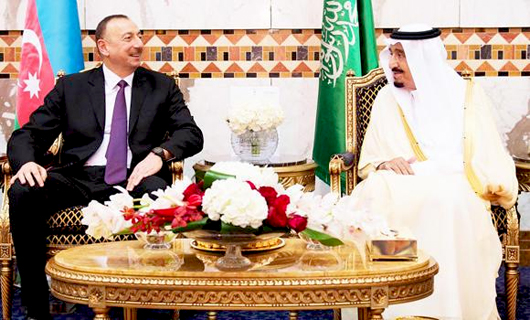Riyadh, Apr 6: Azerbaijan President Ilham Aliyev arrived in Riyadh on Sunday on an official visit to the Kingdom. He was received by Custodian of the Two Holy Mosques King Salman at the Riyadh Air Base.
Amid the critical situation in the Middle East, the visit of a head from a Central Asian country is deemed significant for both sides, according to an expert.
Aliyev last visited the Kingdom in 2005.
Crown Prince Muqrin, Deputy Crown Prince Mohammed bin Naif and Riyadh Gov. Prince Faisal bin Bandar were among those who received the Azerbaijani president.
Following an official luncheon, the two leaders held discussions on various issues, including bilateral cooperation and ways of enhancing relations in various sectors. They also reviewed the latest developments in the region and the world.
Foreign ministers of the two countries were also present.
Azerbaijani Ambassador Rasim Rzayev told Arab News that this historic visit marks 23 years of friendly relations between the two countries.
“Azerbaijan established diplomatic relations with the Kingdom on Feb. 24, 1992, making it one of the first countries to recognize the independence of Azerbaijan. In April 1994, the Azerbaijani Embassy was opened in Riyadh followed by the inauguration of the Saudi Embassy in Baku in June 1999,” he said.
The relationship between Azerbaijan and Saudi Arabia is based on mutual respect, brotherhood and friendship, with a shared Islamic heritage and historical roots. “Our peoples have similar roots in culture and traditions, as well as in religion,” said Rzayev.
The official visit of the president to the Kingdom in 2005 set the stage for the development of bilateral relations.





Comments
Add new comment